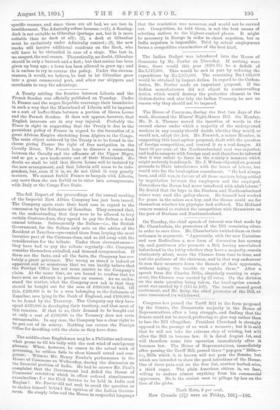The House of Commons, during the first two days of
the week, discussed the Miners' Eight-Hours Bill. On Monday, Mr. D. A. Thomas moved the insertion of words in the second clause under which a majority of the underground workers in any county .should decide whether they would, or would not, adopt the Act. Mr. Fenwick, a miner Member, in supporting this local-option proposal, dealt with the question of foreign competition, and treated it as a real danger. At least 80 per cent. of the Northumberland coal was exported, and had to compete with foreign coal, and therefore he inferred that it was unfair to force on the °minty a measure which might seriously handicap it. Mr. 3. Wilson objected on general grounds to State interference with the hours of labour, but would vote for the local-option amendment. " He had always been, and still was, in favour of all these matters being settled by negotiation between the employers and the employed. Heretofore the House had never interfered with adultlabour." He denied that the boys in the Durham and Northumberland mines were used like galley-slaves. He himself had worked for years in the mines as a boy, and the House could see for themselves whether his physique had suffered. The Midland owners wanted to restrict the competition with themselves on the part of Durham and Northumberland.


































 Previous page
Previous page